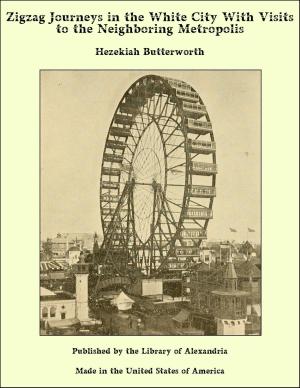| Author: | Thomas Wilkinson Speight | ISBN: | 9781465621696 |
| Publisher: | Library of Alexandria | Publication: | March 8, 2015 |
| Imprint: | Language: | English |
| Author: | Thomas Wilkinson Speight |
| ISBN: | 9781465621696 |
| Publisher: | Library of Alexandria |
| Publication: | March 8, 2015 |
| Imprint: | |
| Language: | English |
It was a sunny February afternoon when Mr. John Fildew put his nose--aquiline and slightly purple as to its ridge--outside the door of his lodgings for the first time that day, and remarked to himself, with a shiver, that the weather was "beastly cold." After gazing up the street and down the street, and seeing nothing worth looking at, he shut the door behind him and strolled leisurely away. Hayfield Street, in which Mr. Fildew's lodgings were situate, was, despite its name, as far removed, both in appearance and associations, from anything suggestive of country or rural life as it well could be. It was of the town towny. Every house in it--and they were substantial, well-built domiciles, dating back some seventy or more years ago--was let out to three or four families, while in many cases the ground-floors had been converted into shops, in one or other of which anything might be bought, from a second-hand silk dress or sealskin jacket to a pennyworth of fried fish or a succulent cow-heel. In whatever part of the street you took your stand a couple of taverns were well within view, and, as a matter of course, there was a pawnbroker's emporium "just round the corner." It is needless to say that the street swarmed with children of all ages and all sizes, and that you might make sure of having the dulcet tones of a barrel-organ within earshot every ten minutes throughout the day. It was situate somewhat to the west of Tottenham-court Road, and ran at right angles with one of the main arteries that intersect that well-known thoroughfare. In this populous locality Mr. Fildew and his wife rented a drawing-room floor, consisting of three rooms, and including the use of a kitchen below stairs; and here they had lived for between six and seven years at the time we make Mr. Fildew's acquaintance. As we shall see a great deal of that gentleman before the word Finis is written to this history, it may perhaps be as well to introduce him with some particularity to the reader before setting out with him on his afternoon stroll. John Fildew at this time was about fifty-two years of age, but looked somewhat older. Thirty years previously he had been accounted a very handsome man, and there were still sufficient traces of bygone good looks to make credible such a tradition. But the once clear-cut aquiline nose was now growing more coarse and bibulous-looking with every year, and the once shapely waist was putting on a degree of convexity that troubled its possessor far more than any other change that time had seen fit to afflict him with. As yet he was by no means bald, and his iron-gray hair, however thin it might be at the crown, was still plentiful at the sides and back, and being seldom operated upon by the tonsorial scissors, its long, straggling ends mingled with the tangled growth of his whiskers and lay on the collar of his coat behind. Grizzled, too, were whiskers, beard, and mustache, but all unkempt and apparently uncared for, growing as they listed, and only impatiently snipped at now and again by Mr. Fildew himself, when his mustache had grown so long as to be inconvenient at meal-times. His eyes were his best feature.
It was a sunny February afternoon when Mr. John Fildew put his nose--aquiline and slightly purple as to its ridge--outside the door of his lodgings for the first time that day, and remarked to himself, with a shiver, that the weather was "beastly cold." After gazing up the street and down the street, and seeing nothing worth looking at, he shut the door behind him and strolled leisurely away. Hayfield Street, in which Mr. Fildew's lodgings were situate, was, despite its name, as far removed, both in appearance and associations, from anything suggestive of country or rural life as it well could be. It was of the town towny. Every house in it--and they were substantial, well-built domiciles, dating back some seventy or more years ago--was let out to three or four families, while in many cases the ground-floors had been converted into shops, in one or other of which anything might be bought, from a second-hand silk dress or sealskin jacket to a pennyworth of fried fish or a succulent cow-heel. In whatever part of the street you took your stand a couple of taverns were well within view, and, as a matter of course, there was a pawnbroker's emporium "just round the corner." It is needless to say that the street swarmed with children of all ages and all sizes, and that you might make sure of having the dulcet tones of a barrel-organ within earshot every ten minutes throughout the day. It was situate somewhat to the west of Tottenham-court Road, and ran at right angles with one of the main arteries that intersect that well-known thoroughfare. In this populous locality Mr. Fildew and his wife rented a drawing-room floor, consisting of three rooms, and including the use of a kitchen below stairs; and here they had lived for between six and seven years at the time we make Mr. Fildew's acquaintance. As we shall see a great deal of that gentleman before the word Finis is written to this history, it may perhaps be as well to introduce him with some particularity to the reader before setting out with him on his afternoon stroll. John Fildew at this time was about fifty-two years of age, but looked somewhat older. Thirty years previously he had been accounted a very handsome man, and there were still sufficient traces of bygone good looks to make credible such a tradition. But the once clear-cut aquiline nose was now growing more coarse and bibulous-looking with every year, and the once shapely waist was putting on a degree of convexity that troubled its possessor far more than any other change that time had seen fit to afflict him with. As yet he was by no means bald, and his iron-gray hair, however thin it might be at the crown, was still plentiful at the sides and back, and being seldom operated upon by the tonsorial scissors, its long, straggling ends mingled with the tangled growth of his whiskers and lay on the collar of his coat behind. Grizzled, too, were whiskers, beard, and mustache, but all unkempt and apparently uncared for, growing as they listed, and only impatiently snipped at now and again by Mr. Fildew himself, when his mustache had grown so long as to be inconvenient at meal-times. His eyes were his best feature.















